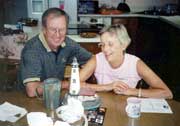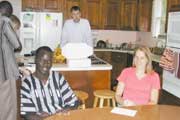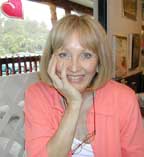|
|
 |
|||||
|
Volume 13, Issue 23 ~ June 9 - 15, 2005
|
||||||
These orphans escaped Sudan’s death squads, survived years in the wilderness, waited years more in refugee camps only to find themselves home in Annapolis. by Janice F. Booth Reserved and thoughtful, a broad-shouldered, handsome, young man with ebony skin listens attentively. He appears at ease in the student union of Anne Arundel Community College. Suddenly, a metal chair clatters to the terrazzo floor; someone hoots with laughter. He winces and jerks his head aside. He has heard such sounds in the past, when they have brought death. What memories must flood the mind and heart of someone with Amal Athieu’s experiences, a survivor of both Sudan’s brutal civil war and over 13 years as a hunted refugee? This is our first meeting, and we talk abstract topics: Sudanese oil and natural resources, global finance and international law. Then our conversation circles deeper to Sudanese death squads, Muslim and Christian paramilitary squads, suffering and loss. Attempting to understand Amal’s odyssey, I draw a crude map of Sudan on a scrap of paper. Amal’s kind, liquid eyes follow my pencil. Courteous in the extreme, he wouldn’t think of correcting me. But he excuses himself, pulling from around his neck a lanyard with its attached flash drive. Five minutes later he’s back, quietly sliding my crude drawing under a computer printout map of Sudan complete with tribal or ethnic territories. At 25 or 26, Amal occupies Western culture and employs its technology with ease. For Amal and his kin, adaptability, self-reliance and knowledge have meant survival — not only here in the United States but before that in Kenyan and Ethiopian refugee camps, and before that in the wilderness of South Sudan. Computers, memory chips, cell phones and automobiles are some of the tools Amal has learned to use in the four brief years he has lived in the United States. Sitting here in this bustling, public place, all glass and chrome — iPods, flash drives, Blackberries and laptops everywhere — this quiet man gives no clue that the millennium had passed before he saw a computer, watched a television, spoke on a telephone, drove a car, ate in a restaurant or entered a schoolroom. Amal may see all these conveniences as trivial. Safe now from death squads and wild animals, with enough to eat and a clean, well-lighted place to study, he has life’s necessities. Amal’s calm confidence results in part from a life that has taken him through hell and brought intense experiences and opportunities. He is one of the 26,000 children of southern Sudan who were driven from their families and homes in 1987. He is one of the Lost Boys of Sudan. Before the Darkness Amal’s story begins as the first-born son of a prosperous cattleman and farmer, Madol Athieu, in a small village in southern Sudan near the ancient Nile River. His village was one of the many communities of the Dinka tribe of southern Sudan. Amal thinks he was born in 1979; if his memory serves, he is 26. This and other important dates he now calculates by their relationship to the murderous raids and flight when his world exploded in fire and carnage. Like all the boys in the peaceful village of Tot Yirol, Amal learned early how to tend his father’s cattle in the communal pastures. Traditionally, boys as young as five spent weeks away from the village, guarding the cattle and working with the men and other boys. That tradition saved the lives of Amal and many other boys. The apprenticeship demanded a great deal of these children, who learned sacrifice early. As rite of passage into the Dinka tribe, elders extract five lower teeth and one eye-tooth from each child’s mouth. There is no mistaking one’s fellow tribesman; the smile tells all. Amal seldom smiles. When he does, his silver braces flash and his face grows more boyish. There have been few reasons for Amal to smile in the last 17 years. In 1987, as he watched over his father’s cattle in the hills, paramilitary death squads from northern Sudan attacked his village, set fire to homes and fields, killed, raped and kidnapped defenseless villagers: women, girls, babes and the elderly. Those militiamen were backed by the Muslim Sudanese government, sent to obliterate the Dinkas, a predominantly Christian tribe. The same atrocities committed 18 years ago in southern Sudan are repeated today in the mainly Christian, Darfur region of western Sudan. The men of Amal’s village, in the hills with their sons and their cattle, learned of the militia raid on Tot Yirol from terrorized villagers fleeing the attack. While Amal’s father and the other men rushed to defend the women and girls, the boys remained behind to guard the livestock. Amal was eight and remembers watching in terror as plumes of smoke and flames rose in the sky above his home. He never saw his parents or his home again. Soon, word was sent to the boys to run, escape. Across the region, Dinka boys as young as four and five fled their region for the protection of the forest, the desert and the mountains. Thus began the nightmare march of the children — on foot, without provisions, protection or guidance. Wandering in the Wilderness According to the American Red Cross, 26,000 Sudanese boys, orphaned in raids similar to the one on Amal’s village, crossed on foot more than 600 miles of desert, mountains and forest during six months in 1987. They carried nothing: no food or water, no extra clothes or shoes or blankets. Amal was then eight years old. He remembers his younger self crouching beneath a canopy of trees, watching in terror as militia planes scoured the open areas, dropping bombs that “fell like paper from the sky and exploded with bright flashes.” By day, the boys stayed under whatever cover they could find, not eating or moving, waiting for darkness when they could move away from the danger they knew … toward the danger they did not. Amal recounts those months calmly, without rancor. “The older boys looked after the little ones. We tried to encourage one another. We were afraid to move and afraid to stay. We had to look out for ourselves.” This first flight from certain death took six months. The children ate almost nothing, chewing grass and leaves for their moisture, insects and small creatures for protein. “Sometimes, U.N. or Red Cross planes would fly low, dropping food and water to us,” Amal recalls. “We wouldn’t have made it without those planes. We never knew when they would find us, or who would find us. “Many children died of starvation, disease, injuries and attacks by wild animals. We watched as boys sat down where we walked. They just laid down and died.” Amal speaks quietly and calmly, never wincing at the memory. He bares witness for the boys who could not go on. Such painful facts are the details of his memories, no more, no less. Like Elie Wiesel and Anne Frank for the Jews, Amal Athieu bares witness for the Dinkas. At the Gates Some 20,000 boys and a small number of girls reached Ethiopia and a United Nations Refugee Camp there, but they were denied access at first. Officials warned the boys away. “We had to remain in hiding among the trees, out of sight. The officials would come and say they were seeing what they could do for us,” Amal recalls. His voice is soft and calm as he remembers those weeks at the edge of the forest, all those children, emaciated, injured, ill, waiting alone under the trees — looking across to the forbidden sanctuary. Ethiopia, fearing retaliation from Sudan’s Khartoum government, resisted providing sanctuary for the fleeing Sudanese children. Eventually, U.N. workers brought blankets and food to the thousands of children. “Stay hidden” they were warned. “We are not authorized to take you in — yet.” Amal remembers the Sudanese planes swooping low above the forest and the refugee camp. The Ethiopian government had to defend its sovereignty. Backed by the United Nations, Ethiopia warned Khartoum to recall its bombers. Finally, in a gesture of defiance, Ethiopia demanded that one of the planes land immediately, which it did — on the sand just beyond the camp. The menacing skeleton of that Sudanese bomber still scars the Ethiopian border and Amal’s memory, symbol of the tenuous peace between these neighboring countries. Four years passed for these refugee children in Ethiopia. Five-year-olds grew to nine, eight-year-olds grew into adolescents — without parents, without homes, without family — but not without friends and not without hope. The boys formed families of nine or 10 children, usually gathering by villages. Older boys organized the distribution of the blankets and food. Every child had someone to look after and was in turn looked after. Eventually, cooking, clean-up and teaching tasks were assigned. Christian services were held, led by the boys themselves. “We made our own families,” Amal says. Amal may have fared better than many. Since he was older when he fled his home, he has his faith and his memories. He knows his family, his ancestors, his religion and his own childhood. Boys who were only four or five years old when they fled the slaughter have nothing to remember except loneliness, hunger and fear. To fill the long months and years in Ethiopia, the children studied English. Families built raised platforms or tables of dirt. Ten boys sat cross-legged around each table. Aid workers made boards from cardboard boxes and printed the English alphabet in charcoal. The children etched each letter in the tabletop’s dirt, then swept the soil smooth and wrote their letters again. As boys mastered the ABCs they moved to other tables where they learned words and English pronunciation. And years passed … Escape and Loss In 1991, Ethiopia succumbed to pressure from the Sudanese government, and suddenly the refugee camp closed. Once again, 20,000 boys ran for their lives, with tanks and bombers in close pursuit. It was monsoon season, and through the torrential rain the children rushed into the wilderness, toward the river, toward Kenya. The Gilo River stood between the escaping Sudanese orphans and safety. The river swells with the spring monsoons, growing as wide as the Potomac, running fast and brown. Debris, uprooted trees, rocks, drowned animals tumble in the current. Along the shore, hungry crocodiles, large as grown men, wait. That April in 1991, thousands of children rushed headlong toward the river and safety. Like the National Geographic films of migrating antelope, thousands of boys at a time frantically plunged into the wild waters of the Gilo; many drowned or fed the crocodiles. River crocodiles locked their great jaws onto thin bodies; blood and screams filled the water and air. According to the Red Cross, only half the boys who set out from Ethiopia reached the relative safety of Kenya’s Kakuma Refugee Camp. The journey took 12 months. By 1992, only 10,000 boys of the original 26,000 were still alive. Amal and all his family of boys survived the exodus. They would remain in the Kakuma Refugee Camp for nine years more. The Lost Boys Are Found In 1998, Amal read an announcement posted in camp. The International Rescue Commission invited boys to submit essays, in English, chronicling their lives. Some of the boys from Kakuma might be chosen to leave Kenya and go to live in the United States. The U.S. government was willing to grant refugee status to at least 4,000 boys from South Sudan. The International Rescue Commission called this the Lost Boys of Sudan Project. Amal and three of his refugee-brothers — David Tit, Deng Kuol and Pandak Deng — were among the hundreds who prepared essays. “They quizzed us in English on all the details of our lives,” recalls Deng Kuol, Amal’s refugee brother. Deng was only six when he fled his home. “I thought they were trying to trick me, to see if I really wrote my essay, if that was my real life story.” Three years of interviews and ever-shorter lists followed. Amal and his three refugee-brothers were among the first group chosen; 3,800 Lost Boys would be relocated to the United States by the fall of 2001. They would be given refugee status and a mere six months to acclimate, find full-time employment and take up residence. If they failed, they would be deported. At 21, Amal faced an entirely new series of daunting, life-transforming challenges, including a plane trip across the Atlantic. “We had an orientation before we got on the plane,” he says. “They showed us how to use the toilet, how to put on a seatbelt, everything.” Amal still sounds delighted and awed by this adventure. The American Way Amal and his three refugee-brothers — Deng Kuol, David Tit and Pandak Deng — have remained together in America over these last four years. Their first home was Atlanta, where they quickly found jobs, rented an apartment and tried to begin educating themselves for professions including law, nursing and accounting. Because they had no high school diplomas or GEDs, Amal and his brothers were refused admission to any college or training program. Giving up on an education was never an option. They then applied to Atlanta’s night school and GED programs but were denied admission because they were refugees. These Lost Boys had faced such disappointments and seemingly insurmountable obstacles many times. They had learned that one makes one’s own opportunities, both in Africa and now in America as well. While working and struggling to get an education, Amal found his faith rekindled. Though Atlanta’s Lost Boys had lost a great deal, they would not lose their faith or their culture. The Lost Boys of Sudan founded a Christian church in the Dinka tradition and met each Sunday to worship and encourage one another. A New Village One Sunday in 2002 at their regular service, Amal, Deng, David and Pandak met other helping hands. Lorraine and Jim Hiskey from Annapolis were visiting in Atlanta. As lay-ministers, they chose to attend a service at the Dinka Christian Church. After the service, Lorraine and Jim met Amal and his band of brothers and learned a bit of their story. Lorraine promised to keep in touch with these courageous young men, and she kept her promise. In the meantime, Amal and the others were still without GEDs, and the door to college educations remained closed. The Job Corps program opened a door to that opportunity. Potomac Job Corps Center’s director, Celeste McDonald, acquired grant money to fund the sponsorship of all four young men in their Believe It – Because It Is Possible program. They moved to the District of Columbia from Atlanta, took up urban housing, joined a GED program and started full-time jobs. Once again, the Lost Boys quickly adapted to new conditions and an unfamiliar culture, not in Ethiopia, or Kenya or even Atlanta, but a place that for them was a source of renewed hope and refuge: Washington, D.C., America’s capital. The Hiskeys reached out to Amal and the others in D.C. On frequent visits to Annapolis, the formerly Lost Boys attended the Hiskeys’ own church, Bay Area Community Church, holding services at Annapolis High School. There they found a spiritual home. The four Lost Boys were lost no longer. Lorraine and Jim and the members of Bay Area Community Church have welcomed Amal and his brothers into their lives. The Hiskeys bought a large house, near Anne Arundel Community College, where they have made a home for the four brothers, who in January, 2004, moved from Washington to Annapolis. With three adult children of their own, Lorraine and Jim knew what they were signing up for. They take seriously their commitment to these Lost Boys, Amal, Deng, David and Pandak. With help from the Bay Area Community Church, the Hiskeys have found local jobs for their new sons, enrolled them in the community college and made sure each has the accoutrements of the American college student, including clothing, TV, radios, computers, cell phones, a car and even tickets to the Wizards and Orioles games. Health care for Amal, Deng, David and Pandak is donated by general practitioner Matt Malta. Annapolis dentist Scott Finlay and orthodontists Errol Phillip and Edford Chamber are transforming those Dinka half-smiles into all-American grins. And New Ways Amal and his brothers attend to their college courses and jobs while Lorraine and Jim attend to their home life. Young couples from the church take up residence at the house for several months at a time, house-parents and counselors to the guys. Lorraine, Jim and volunteers from the church have been teaching the Lost Boys to budget and save money, plan schedules, keep appointments and to shop, cook and do laundry for themselves. These are skills never required of Amal, Deng, David and Pandak while growing up in desolate refugee camps without adult guidance and counsel, without electricity, running water, calendars, clocks or schools. The dreams and plans of these young men have expanded with their broadened horizons. Amal plans to transfer to the University of Maryland, College Park, next January; eventually, he will study law; Deng, accounting; David, medicine; and Pandak, nursing. Amal has found his mother, and they have spoken by phone of family and friends. With financial help from Amal, two of his brothers have been plucked from refugee camps and are now rebuilding their lives in Australia. Deng is in contact regularly with cousins living in California and Arizona. Pandak’s brother has already traveled back to the refugee camps to offer hope to his Dinka brothers left behind. David left June 9 for South Sudan, returning for the first time since 1987. As part of the South Sudan School Project, he’ll help deliver over 800 backpacks filled with school supplies. The four Lost Boys are eager to help their country find order and establish the rule of law in an independent South Sudan. With the ratification in January, 2005, of a peace agreement between the Sudanese government in Khartoum and the Sudanese People’s Liberation Movement, hope for peace is renewed in their homeland. According to reports from National Public Radio, more than $4.5 billion in aid is pledged for the reconstruction of South Sudan. Amal may one day help redraw that map and rebuild the communities. South Sudan will need wise, compassionate, educated leaders like Amal and his brothers to shepherd not the cattle on the hillsides but the rebuilding of the Dinka tribe and the new nation of South Sudan. Amal is preparing. He listens attentively, reserved and thoughtful, to the international dialogue swirling about his homeland and his people.
|
||||||
|
© COPYRIGHT 2004 by New Bay Enterprises, Inc. All rights reserved. |


 The Foster Parents
The Foster Parents The House Parents
The House Parents About the Author
About the Author